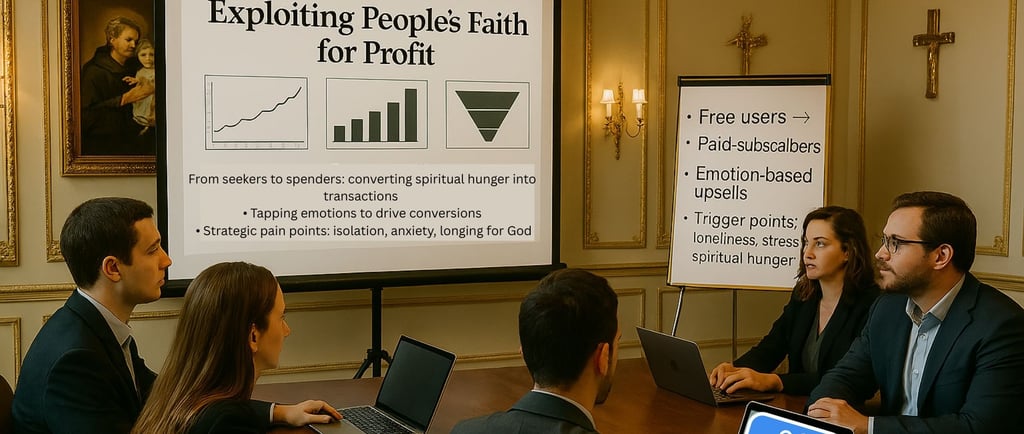The Prosperity Gospel of Tech
What happens when the prosperity gospel evolves for the digital age? Today’s biggest Christian apps are blending faith with for-profit sales funnels—offering prayer and devotionals behind paywalls, and turning spiritual hunger into subscription revenue. The manipulation Jesus flipped tables over in the temple… has gone mobile. Are we witnessing the next sneaky form of prosperity gospel—this time, coded into your phone?


The freemium model—common in gaming and entertainment apps—has now crept into the Church’s digital space.
And honestly… it’s starting to look a lot like the kind of manipulation Jesus flipped tables over in Matthew 21:12-13:
"My house will be called a house of prayer, but you are making it a den of robbers.”
Not Ministries—Marketing Machines
Let’s be clear:
Many of today’s prayer and devotional apps aren’t built by ministries.
They’re built by for-profit tech companies.
And by definition, a for-profit company has one mission above all else:
👉 Maximize revenue.
That means:
Their app design
Their push notifications
Even their prayer reminders
…are often shaped by one driving goal:
Move you from the free version… to the paid upgrade.
This isn’t just about covering hosting fees or paying developers.
It’s about converting Christian users into paying customers—often by leaning on their desire for spiritual closeness, healing, or peace.
The formula?
✅ Give just enough away for free...
✅ Withhold meaningful spiritual tools...
✅ Then use emotional triggers to push users toward paid subscriptions.
“It’s the digital equivalent of setting up tables in the temple courts—not to drive out money changers, but to become one of them… cloaked in Christian branding.”
This is a well-known strategy in Silicon Valley.
But when it’s packaged in Christian language, it becomes something else entirely:
Digital spiritual manipulation.


Over $237 million has been poured into Christian prayer app startups in the last decade.
Companies like Hallow, Glorify, and Pray.com have raised tens of millions in venture capital.
And venture capitalists don’t invest for ministry impact…
They invest for profit return.
📈 Behind the Curtain: How This Works
Picture this:
A group of app developers, marketing managers, and growth strategists sit around a long boardroom table.
On the screen:
Charts showing user engagement, retention rates, and conversion funnels.
On the whiteboard:
Bullet points like:
“Free users → Paid subscribers”
“Emotion-based upsells”
“Trigger points: loneliness, stress, spiritual hunger”
They aren’t praying over how to help believers grow closer to Christ…
They’re brainstorming how to get you to upgrade.
💸 Godliness for Gain: Scripture Calls It Out
This isn’t just a business issue.
It’s a spiritual issue.
1 Timothy 6:5 warns of people:
“Supposing that godliness is a means of gain.”
Paul told Timothy to stay away from people like that.
And yet… here it is today:
Pay for deeper prayer prompts
Unlock exclusive prophetic words
Upgrade for better spiritual insights
It’s spiritual upselling, neatly packaged behind clean UI and soft worship music.
What We’re Doing at MATTEH MOSHE
We believe Christian tech should:
✅ Strengthen prayer lives—without preying on wallets
✅ Create tools that help churches and believers grow—without emotional manipulation
✅ Equip Christian creators to launch digital platforms that serve… not sell out faith


The freemium model—common in gaming and entertainment apps—has now crept into the Church’s digital space.
And honestly… it’s starting to look a lot like the kind of manipulation Jesus flipped tables over in Matthew 21:12-13:
"My house will be called a house of prayer, but you are making it a den of robbers.”
Not Ministries—Marketing Machines
Let’s be clear:
Many of today’s prayer and devotional apps aren’t built by ministries.
They’re built by for-profit tech companies.
And by definition, a for-profit company has one mission above all else:
👉 Maximize revenue.
That means:
Their app design
Their push notifications
Even their prayer reminders
…are often shaped by one driving goal:
Move you from the free version… to the paid upgrade.
This isn’t just about covering hosting fees or paying developers.
It’s about converting Christian users into paying customers—often by leaning on their desire for spiritual closeness, healing, or peace.
The formula?
✅ Give just enough away for free...
✅ Withhold meaningful spiritual tools...
✅ Then use emotional triggers to push users toward paid subscriptions.
“It’s the digital equivalent of setting up tables in the temple courts—not to drive out money changers, but to become one of them… cloaked in Christian branding.”
This is a well-known strategy in Silicon Valley.
But when it’s packaged in Christian language, it becomes something else entirely:
Digital spiritual manipulation.


Over $237 million has been poured into Christian prayer app startups in the last decade.
Companies like Hallow, Glorify, and Pray.com have raised tens of millions in venture capital.
And venture capitalists don’t invest for ministry impact…
They invest for profit return.
📈 Behind the Curtain: How This Works
Picture this:
A group of app developers, marketing managers, and growth strategists sit around a long boardroom table.
On the screen:
Charts showing user engagement, retention rates, and conversion funnels.
On the whiteboard:
Bullet points like:
“Free users → Paid subscribers”
“Emotion-based upsells”
“Trigger points: loneliness, stress, spiritual hunger”
They aren’t praying over how to help believers grow closer to Christ…
They’re brainstorming how to get you to upgrade.
💸 Godliness for Gain: Scripture Calls It Out
This isn’t just a business issue.
It’s a spiritual issue.
1 Timothy 6:5 warns of people:
“Supposing that godliness is a means of gain.”
Paul told Timothy to stay away from people like that.
And yet… here it is today:
Pay for deeper prayer prompts
Unlock exclusive prophetic words
Upgrade for better spiritual insights
It’s spiritual upselling, neatly packaged behind clean UI and soft worship music.
What We’re Doing at MATTEH MOSHE
We believe Christian tech should:
✅ Strengthen prayer lives—without preying on wallets
✅ Create tools that help churches and believers grow—without emotional manipulation
✅ Equip Christian creators to launch digital platforms that serve… not sell out faith

The Gospel Was Never a Product
Don't let digital prosperity models turn faith into just another revenue stream.

